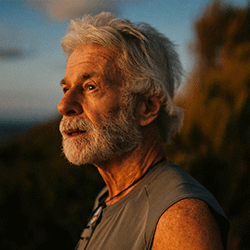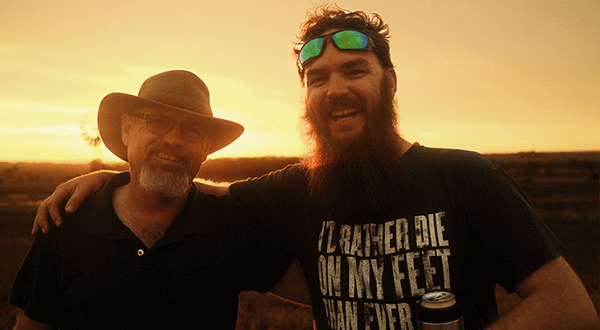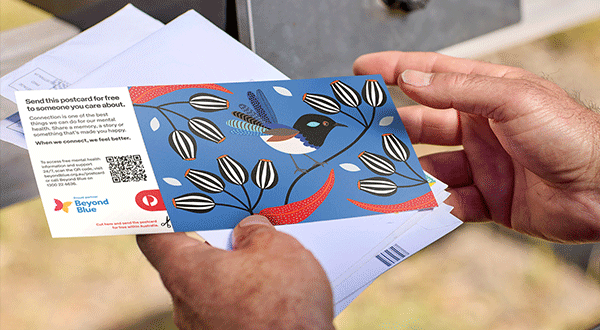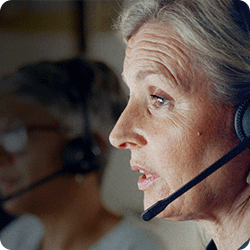What is loneliness?
Being isolated isn’t the only reason for loneliness, but it can be a big part of it. People in rural communities might feel more isolated than those in cities. During the pandemic, many of us felt lonelier.
While people in rural and remote areas may be more likely to experience loneliness, some First Nations Peoples living in cities and urban settings can also feel deeply isolated – especially when they are off-country, far from family and kin, or disconnected from their home country.
Loneliness is very closely tied to disconnection. If you feel like those around you see you differently because of your gender, age, cultural background or disability, it can make you feel excluded and like you don’t belong.
- Sandi
You are not alone in feeling lonely - many people living in Australia are.


Support is available if you’re feeling lonely
How does loneliness affect mental and physical health?
Occasional loneliness is normal, but long-term loneliness can affect mental health. Long-term loneliness has been linked to depression, anxiety, and physical issues like chronic pain. It can also increase stress hormones, affecting sleep and immunity.
For First Nations Peoples, even brief periods of loneliness can disrupt the deep relational and cultural ties that are central to wellbeing. Short-term loneliness affects mental, emotional and social wellbeing and is often intensified by unique historical and systemic factors. This needs culturally grounded approaches to restore community, kin, and cultural connections. Learn more about country, culture and spirituality -->
Sometimes people cope with loneliness through unhealthy habits like substance misuse, gaming, overeating, or exercising or working too hard. Not everyone who feels lonely will do these things, but it’s common and understandable if loneliness is proving hard to overcome.
What causes loneliness?
- Big life changes like moving to a new place or starting at a new job or school.
- Disconnection from country, culture and spirituality for First Nations Peoples.
- Going through a breakup, or a long-term friendship ending.
- Grieving the death of a family member or friend.
- Living with a mental health condition.
- Looking for a romantic relationship.
- Becoming a parent.
- Displacement, racism and systemic barriers affecting First Nations Peoples.
- Being excluded from a group or wider society because of culture or language, racial discrimination, disability, gender, or sexual orientation.
- Not being able to join in activities because of financial hardship or caring for someone else, or other barriers you can’t control.
- Feeling a lack of confidence in knowing how to connect with new people.
- Not trusting relationships and finding it hard to open up to people.
What is belonging?
Social connection and belonging can improve loneliness
A sense of belonging means feeling accepted and valued by a group, which makes us feel secure, seen and heard.
Belonging is something that is relevant to all the different places we live in, like school, work, on a sports team, in a religious community, or in a country and culture.
Belonging is more than just knowing people. Belonging is about getting and giving acceptance, attention, and support.
Our need for belonging is common to all human beings and it includes feeling accepted for who we are: our cultural identity, ability, gender, LGBTIQ+ identity, or racial background.
Feelings of loneliness for First Nations Peoples can be complicated by intergenerational trauma along with persistent discrimination. Recognising and learning from the wisdom and strengths in First Nations' connections to country and culture can foster a deeper sense of belonging and ease loneliness and disconnection.
Small actions help in big ways to cope and overcome loneliness


You’re not alone if you’re feeling lonely
Loneliness in Australia in 2025
- Almost 1 in 3 people feel lonely, and people in rural areas are more likely to feel lonely.
- 1 in 6 people are experiencing severe loneliness (reporting that they often or always feel lonely).
- 15-24-year-olds are feeling lonelier than any other age group.
Loneliness is nothing to feel ashamed about
One of the biggest barriers to people reaching out for support about loneliness is a feeling of shame. More than half of people living in Australia say they don’t talk to others about feeling lonely, and nearly half say they’re too embarrassed to admit this to others.
Shame can discourage people from reaching out for connection and support, which means that things get worse needlessly.


Initiatives like Loneliness Awareness Week and Ending Loneliness Together are bringing together Australians from all walks of life to share their experiences of loneliness and the power of meaningful social connection.
How to cope with loneliness
Some things to remember
- Feeling lonely can be tough, but social connection and belonging are possible for everyone.
- Connecting with others is a skill you can learn and practice.
- Making meaningful connections takes time.
- Feeling lonely doesn’t mean there’s something wrong with you.
- Understand that relationships change, and everyone goes through change.
- Recognise your moods and give yourself a break when you need it.
- Focus on things you love and enjoy and give yourself time to enjoy them.
Practice self-care and reflect on how you're feeling with Beyond Blue’s PACE: Daily Wellbeing app.
How do you overcome loneliness?
- The best place to start is by being comfortable in your own company – enjoy your hobbies, do things you like to do, get out into nature if that’s your thing.
- Start out small, saying hi to a neighbour or shopkeeper.
- When you're ready, reach out to friends or family, join a club, or volunteer.
- Physical exercise is a great way to cope with loneliness, if that’s possible for you. It boosts your mood and can be a social activity too.
- Engaging in activities you enjoy can help you meet new people that like the same things as you and build connections.
- It might take a few goes to get it feeling right so don't get upset if your first attempt at connection isn't what you thought it would be. Stick at it, it takes practice.
Connection with each other and finding a sense of belonging is good for everyone












